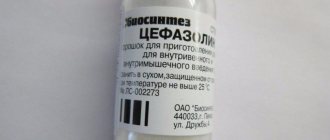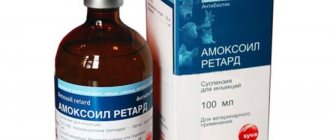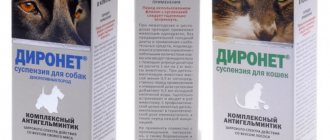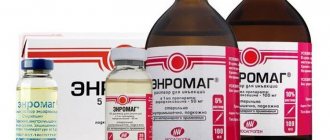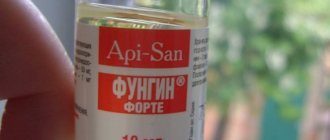Pharmacodynamics and pharmacokinetics
Medroxyprogesterone acetate (MPA) is a progesterone derivative that does not have estrogenic activity and is classified as a gestagen (progestin). The androgenic activity of the compound is minimized. MPA in therapeutic doses reduces the production of pituitary gonadotropins, preventing the maturation of follicles and causing an anovulatory state in women of reproductive age. This effect leads to a decrease in the severity of vasomotor symptoms in menopausal women. MPA also increases the viscosity of cervical mucus, which accumulates in the cervical canal, as a result of which sperm penetration becomes almost impossible.
In some cases, an anabolic effect and anti-inflammatory effect of the drug are noted. In large doses it is characterized by glucocorticosteroid activity.
After intramuscular administration of medroxyprogesterone acetate, it is released quite slowly, which causes a low but constant level of MPA in the blood plasma. The maximum concentration of the substance after injection is reached after approximately 4–20 days, after which the MPA content gradually decreases and is approximately 1 ng/ml over 2–3 months. However, the compound may be present in plasma even 7–9 months after intramuscular administration. About 90–95% of MPA is bound to proteins in blood plasma. The volume of distribution is 20±3 l.
Medroxyprogesterone acetate penetrates the placental and blood-brain barriers, as well as into breast milk. The half-life averages 6 weeks. MPA is metabolized in the liver and eliminated primarily through biliary secretion through the intestine. Approximately 44% of MPA unchanged is excreted through the kidneys. More than 10 metabolites of the compound are known, excreted in the urine, mostly in the form of conjugates.
Covinan i Depo-Provera
- Is it possible to give a cat such an injection, so that she doesn’t ask the cat? - from visiting a veterinary clinic
The question is simple, however, it has a global scale, is relevant for all times, all countries and peoples - where there are cats, there it exists.
And in order to answer it, you need to understand something, and understand it thoroughly.
Believe me, it's worth it.
Only the prince is missing, where did he go?..
Oh, these cat “wants”! More precisely, their lack of demand.
Starting from the age of 8-10 months (or even less!) In the cat’s head, the light bulb of the instinct “be fruitful and multiply!” begins to blink and send a signal, the same one that suppresses all other instincts and turns a cute creature into a small monster - heart-rendingly screaming , rolling around on the floor, leaving odorous marks. An instinct that makes the owner’s life similar to living on a volcano - it is not known when it will “explode”, which night will turn out to be sleepless.
To satisfy the sexual instinct, at least a sexual partner is required. Oops, but no one was going to give it to the cat. As well as creating conditions for the “getting to know each other” process. And the result of the meeting - kittens - is of no use to anyone... Let's not talk about how detrimentally this affects the cat itself - this is described in detail HERE. Let's talk about solving the problem.
What to do?
Of course, the most radical, most effective and healthiest thing in the whole wide world is CASTRATION-STERILIZATION. But the operation requires some effort from the owner, material and time costs and, finally, the desire to do it. It happens that something from this list is missing.
Then chemical melee weapons are used - Ex, Stop-intim, Sex-barrier, Counter-sex and other “contrasts” - pills or drops that interrupt estrus. Alas, they are all short-term or “it helped before, but now it doesn’t work.” Clearly something more efficient is required.
And then the owner comes to the idea that the pet needs a magic injection, about which a neighbor (friend, acquaintance or work colleague) told me: “you put it on, and that’s it!”
Long-acting hormonal contraceptives
There are several of them. But the two most popular are Covinan and Depo-Provera. We will consider them.
Covinan is a veterinary hormonal drug intended to suppress sexual estrus in bitches and cats. The active ingredient is prolygestone, a synthetic analogue of progesterone.
Prolygestone is a steroid hormone that prevents the development of estrus. It increases the viscosity of mucus in the uterus, which prevents the implantation of a fertilized egg, inhibits cell hyperplasia and secretion of the mammary gland. When administered during the phase of sexual rest (anestrus), prolygestone maintains a low concentration of LH - luteinizing hormone - in the cat's body, which provides contraception for the animal. When the drug is discontinued, the amount of prolygestone in the body decreases, normal LH levels are restored, and the contraceptive effect ceases.
How to do it correctly
To develop stable sexual dormancy in a cat, Covinan is used according to the following basic scheme:
INJECTION TIME INTERVAL
first injection during the period of sexual rest (anestrus)
second injection 3 months after the first injection
third injection 4 months after the second injection
subsequent injections 1 time every 5 months
This is how its manufacturer, the Netherlands, suggests putting Covinan. Its specialists conducted scientific research, taking into account the entire complex process of hormone production by the pituitary gland, hypothalamus and ovaries of the cat - all in order to make the drug the most effective and least safe. And this is important, because hormonal drugs are no joke. They also have a downside.
Side effects (from the instructions): When using the drug, in rare cases, pyometritis, endometrial hyperplasia, slight increase in body weight, increased appetite, apathy, and slight hypertrophy of the mammary glands are possible. Immediately after administration of the drug, a minor local painful reaction is possible. At the injection site, lightening of the coat and slight hair loss are possible.
The most common negative consequences are:
- pyometra (purulent inflammation of the uterus)
- breast tumors
- diseases of the endocrine system (diabetes mellitus)
Now let's look at the contraindications (from the instructions): Covinan is not used for pregnant or lactating animals; during estrus (estrus); animals with diseases of the genitourinary system; animals with prolonged vaginal discharge. For animals suffering from diabetes, the drug is used with careful monitoring of blood glucose levels.
Everything seems simple - injections are given according to a simple schedule during the period when there is no sexual heat. What do we have in reality?
Here's how it's usually done
As has been our custom since time immemorial, the system works “until the thunder strikes...”. While the cat is calm, its owner is also carefree. So she screamed obscenities, rolled on the floor, and began, God forbid, to shit in inappropriate places - and then the owner ran with her to the nearest hospital. He comes running and says: “Do something!”
And veterinarians are different - good and not so good. A good doctor, out of all the possibilities of “anything”, really wants to perform an operation - “the healthiest in the whole wide world.”
- The doctor suggests sterilization first of all. But the owner believes that an injection is the best solution to the problem.
- Then a good doctor talks about the possible consequences of such a hormonal injection. But the owner still believes that an injection is the best solution to the problem.
- Then a good doctor examines the cat and, having detected signs of estrus, explains that it is a contraindication to the administration of the drug and talks about the correct regimen. But the owner still insists on the injection.
- Then a good doctor gives this injection. Why? Yes, because in case of refusal, the stubborn owner will go to another clinic, where there may not be a very good doctor.
A not very good doctor will give the injection right away.
Depo-Provera Unlike veterinary Covinan, Depo-Provera is a medical drug, one of the first synthetic progesterone hormones, developed to prevent conception in women (and also as a treatment for certain gynecological and oncological diseases). The active ingredient is medroxyprogesterone. It comes in the form of a suspension or tablets.
Due to its ability to suppress ovulation, Depo-Provera is used as a long-acting contraceptive.
The drug has restrictions on use and a wide range of side effects, including reactions from various organs (in women). For cats, estrus is still a contraindication. The same negative consequences are also possible.
Depo-Provera is preferred by veterinarians at clubs and nurseries, and breeders of purebred cats.
Who can and needs it?
It is advisable to use hormonal drugs to interrupt estrus in breeding animals, cats that have contraindications to anesthesia and surgery in general (for example, with heart disease, kidney disease, etc.). Contraceptives are also given to cats whose estrus unexpectedly resumes after castration.
Cats in breeding
Perhaps, this category of animals really needs long-acting contraceptives. The mating and resting schedule between them implies the presence of empty heats, and hormonal drugs such as Covinan or Depo-Provera (or its analogues) help to survive them with the least damage.
Here's how a veterinarian who works with cat nurseries talks about it (watched on the forum of the Vetmedical portal): If the animal is a breeding animal, used for breeding, but has violent, debilitating estrus, the use of hormones in adequate doses and at adequate times is justified. True, such cats are not removed from breeding at an advanced age. Well, there are no options for the operating table.
So, what happens as a result of the injection:
The administration of the drug stops the development of estrus in the cat and removes all its negative manifestations. And everyone will be happy!
Or the cat still ends up on the operating table, only under much worse circumstances. Or treatment of the endocrine system will be required.
Are there always negative consequences after using hormonal contraceptives?
No. This is roulette.
Some cats “sit” on pills and injections all their lives, and no matter what (at least it seems so, since there are no visible changes).
For others, it “shoots” right away. Or after some time (perhaps after a year). If we get lucky.
Gag: Do you know how many owners come to the clinic demanding that their cat be given a hormonal injection? - A lot of. Do you know how many of them do it the way it should be done? - Units. Almost all injections are given “when the need arises,” that is, during sexual heat.
Dear cat owners! If you do not plan to have kittens, sterilize your pet right away. This will make life a lot easier for both him and you. But if you have already decided to fight the reproductive instinct with the help of hormones, then please do it correctly! After all, there is no one else to take care of your cat except you.
PS Is it possible to give a cat such an injection, so that she doesn’t ask the cat? - from visiting a veterinary clinic
Yes, you can. But first of all, be careful. Secondly, is it necessary?
The following doses are used for cats:
5 kg 1.5-2.5 ml
Covinan is administered to animals strictly subcutaneously into the middle part of the skin fold, avoiding intradermal injections, contact with subcutaneous fat deposits and scar tissue. Before use, the bottle with the drug must be shaken thoroughly and the injection site treated with 70% ethyl alcohol.
www.oldbluzcoon.com
Instructions for use of Depo-Provera: method and dosage
In the treatment of breast cancer, the drug is used intramuscularly. The initial daily dosage of Depo-Provera is 500 mg, course duration is 28 days. At the end of this period, they switch to the use of maintenance doses - 2 times a week, 500 mg. Therapy should be continued until signs of disease regression appear.
In the treatment of kidney cancer, the drug is administered intramuscularly at an initial dose of 400-1000 mg per week. If the condition improves and stabilizes over several weeks or months, maintenance therapy is prescribed at 400 mg per month.
Immediately before use, the bottle should be shaken well (the administered drug should take the form of a homogeneous suspension).
Side effects
During therapy, it is possible to develop disorders of some body systems:
- Reproductive system: galactorrhea, dysfunctional uterine bleeding, amenorrhea, bleeding from the genital tract, breast tenderness, decreased libido or anorgasmia, vaginitis, hot flashes, leucorrhoea, lower abdominal pain;
- Digestive system: nausea, discomfort or pain in the abdomen, flatulence;
- Musculoskeletal system: joint and back pain, calf muscle cramps;
- Blood coagulation system: thrombophlebitis, thromboembolism;
- Central nervous system: dizziness, insomnia, increased nervous excitability, drowsiness, depression, fatigue, headache;
- Dermatological reactions: acne, rash, itching, alopecia and hirsutism;
- Allergic reactions: anaphylaxis and anaphylactoid reactions, urticaria;
- Other: hyperthermia, asthenia, moon face and changes in body weight.
Complications from self-medication
Often breeders do not want to contact a veterinarian, but select contraceptives for cats on their own, and this is a big mistake. Incorrectly selected drugs cause enormous harm to the animal.
The consequences may be the following:
- uncontrolled tumor growth;
- hormonal balance is disrupted;
- ovarian cysts appear;
- uterine hyperplasia;
- development of diabetes mellitus;
- CNS lesions;
- purulent lesions of the uterine cavity.
Uncontrolled use of hormonal contraceptives for cats can lead to their painful death.
Cat with a tumor in the abdomen
special instructions
Before starting treatment, it is necessary to conduct a thorough examination of the patient.
If symptoms of thromboembolism develop, the benefit-risk ratio should be assessed before continuing therapy.
When using medroxyprogesterone acetate in high doses in cases of development of the Cushing's symptom complex (fluid retention, moon face, decreased glucose tolerance, increased blood pressure), it is necessary to reduce the dose if possible and carefully monitor the patient's condition. Also, the use of high doses of the drug can lead to weight gain and the development of fluid retention, as a result of which caution must be exercised during treatment of patients whose condition may be adversely affected by these disorders.
It is necessary to carefully monitor the condition of patients who have a history of treatment for depressive conditions, since when using medroxyprogesterone acetate, some patients complained of depression similar to premenstrual depression.
When conducting histological or cytological studies of the endometrium or cervix, the histologist must be warned about the therapy being carried out.
According to the instructions, Depo-Provera should be used with caution in the postpartum period, as this is associated with an increased risk of prolonged and heavy uterine bleeding.
It is believed that the therapy may increase the risk of developing osteoporosis.
The use of the drug should be discontinued in case of sudden partial or complete loss of vision, as well as in cases of double vision, bulging eyes, or migraine attacks. If during the examination swelling of the optic nerve nipple or damage to the fiber vessels is detected, the drug should not be prescribed.
If jaundice develops, the drug should be discontinued.
The use of Depo-Provera can increase the values of liver function indicators, change the results of the test for prothrombin (factor II) and blood clotting factors VII, VIII, IX, X (increasing), and also affect the results of the following laboratory tests:
- Determination of the levels of cortisol, progesterone, estrogens in the blood plasma (downward);
- Determination of gonadotropin levels (downwards);
- Determination of testosterone levels in blood plasma (downwards);
- Determination of the level of pregnanediol in urine (downwards);
- Carrying out a sugar load test (glucose tolerance test);
- Determination of the level of specific globulin that binds sex hormones (downwards);
- Metapyrone test.
Use during pregnancy and lactation
Pregnancy is a contraindication to the use of Depo-Provera, since under certain conditions a connection has been identified between taking progestogens in the first trimester of pregnancy and fetal development abnormalities.
In case of unplanned pregnancy that occurs within 1–2 months after intramuscular administration of MPA, the risk of malnutrition in newborns increases, which increases the risk of intrapartum and neonatal mortality. Such complications are uncommon, since conception occurs rarely during the use of MPA. If pregnancy occurs immediately after the administration of MPA, the woman should be warned about the possible risks to the fetus.
MPA passes into breast milk. There is no evidence that this may be harmful to a breastfed infant, but it is not recommended to prescribe Depo-Provera during the first 6 weeks of the postpartum period.
When is it time to think about it
Having reached 8, and sometimes 10 months of age, a cat begins to enter adulthood; simply put, its body is ready for reproduction and nothing can be done with the laws of nature. Around this time, the cat's first heat begins and a hormonal imbalance occurs in the body. From a small and fluffy ball, your pet turns into a wildly screaming cat. To be honest, such screams will lead the calmest person to a nervous breakdown.
shutterstock
Veterinarians often offer the option of sterilizing the animal, this partially solves the problem. But for various reasons, not all cat owners are ready for surgery. Contraindications for sterilization include:
- kidney diseases,
- heart disease,
- Anesthesia is contraindicated for the animal.
Just as not everyone is ready to have cat dates and wait for subsequent offspring, and if the cat does not have special advantages and pedigree, then another additional headache will arise - where to put the kittens.
Reviews of Depo-Provera
Most often, reviews of Depo-Provera concern its use by women as a means of contraception. Many of them note that taking 150 mg of the drug once every 3 months turned out to be really effective in preventing conception. However, in many cases of using the drug, various side effects are observed, for example, weight gain.
Doctors have different opinions regarding medroxyprogesterone acetate. Some of them recommend using it for all their patients, while other experts believe that the drug is more suitable for older women. There are numerous reviews indicating that the administration of Depo-Provera can cause complications in subsequent pregnancies or make it difficult to conceive even after a long time.
Some people even administer Depo-Provera to cats, using it as a form of contraception. However, the consequences can be severe: experienced breeders claim that 90% of animals remain sterile after using the drug.
What is contraception for cats
The most humane and highly effective way to avoid pregnancy in a cat is the use of contraceptives, which are available in the form of tablets, drops and injections. Birth control pills for cats are made on a plant basis and on a synthetic basis. Herbal preparations have a less pronounced effect, unlike synthetic and hormonal drugs, but they are practically harmless to the animal.
Cat with newborn kittens
Attention! Before choosing a specific drug, you should consult a veterinarian.




